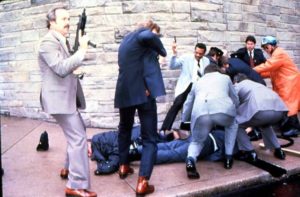John Hinckley wants a judge to grant him unconditional release, to lift the restrictions under which he must navigate his way back into society.
You remember Hinckley. He was acquitted on grounds of insanity after he shot Ronald Reagan in March 1981, coming dangerously close to killing the 40th president of the United States.
President Reagan recovered from his wound. White House press secretary James Brady, tragically, did not. He, too, was grievously wounded; he suffered a gunshot wound to his head. He fought valiantly to restore his speech, his ability to walk. He died of complications from his wounds in 2014.
Hinckley had been hospitalized since he tried to kill President Reagan. He was released from the hospital in 2016. According to MSN.com: Hinckley’s release in 2016 required that he work or volunteer at least three days a week, limit his travel, allow law enforcement to track his movements and continue meeting with a psychiatrist, among other conditions.
Hinckley does not deserve to be released from the restrictions. His doctors say his depression and psychosis are “in remission.”
I’m not a doctor, but to me “remission” does not mean “eradication.” Remissions suggests his ailments can return, just as cancer returns after being in remission.
I happened to agree with the late president’s family, who opposed Hinckley’s release from the hospital. Now I’ll weigh in and ask the judge to deny the killer’s request to lift the restrictions he must obey.
